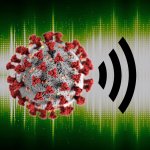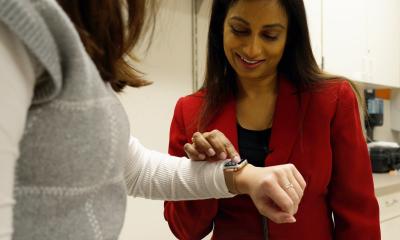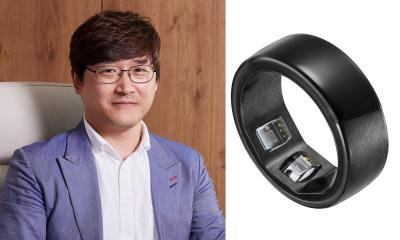Image source: Unsplash/Rodion Kutsaev
News • Heart failure monitoring
App detects fluid in the lungs via voice recordings
Voice analysis by a smartphone app identifies lung congestion in heart failure patients, allowing early intervention before their condition deteriorates.
The small study is presented on HFA Discoveries, a scientific platform of the European Society of Cardiology (ESC). “Speech is personal and as such, very small changes (related to the same person) can be detected – for example, the ability of parents to notice health issues by listening to their kids,” said study author Professor Offer Amir, director of the Heart Institute, Hadassah Medical Centre, Jerusalem, Israel. “Today we report results of the first easy to use, non-invasive, personalised heart failure monitoring device. It requires a simple 30-second recording each day, in any language.”
Recommended article

News • Corona-induced coughing
New app listens to the 'sounds of COVID-19'
A new app, which will be used to collect data to develop machine learning algorithms that could automatically detect whether a person is suffering from COVID-19 based on the sound of their voice, their breathing and coughing, has been launched by researchers at the University of Cambridge. The COVID-19 Sounds App is now available as a web app for Chrome and Firefox browsers. Versions for Android…
Heart failure is one of the leading causes of morbidity and mortality, affecting more than 26 million people worldwide, and is the leading cause of hospitalisation in the US and Europe. Tight surveillance of patients could reduce related hospitalisations and deaths. In patients with heart failure, the pumping function of the heart is not working as it should. The most common symptom is shortness of breath, which is caused by water congestion in the lungs. Congestion can be life-threatening and early identification is crucial.
Lung congestion causes subtle changes in speech patterns, which may be a tool for assessing clinical status. Speech processing is currently used in a number of ways, for example converting text to speech and automatic voice recognition. This study examined the ability of a novel mobile application called Cordio HearO to distinguish between congested and non-congested states. The study included 40 patients admitted to hospital with acute heart failure and lung congestion. Patients were asked to record five sentences into a standard smartphone upon admission and then again just prior to discharge when they were no longer congested. The duration of each recording was 2-5 seconds. The researchers found that the technology successfully distinguished between the congested state at admission and the non-congested state at discharge.
Those with early signs of lung congestion could receive adjustments to their treatment, thereby preventing the need for hospitalisation
Offer Amir
Professor Amir said the system could be used to monitor heart failure patients at home. Physicians prescribe the app, patients download it to their smartphone and submit voice recordings when they feel well so the app can create a personalised “healthy” model. Each day patients add a recording, which the app compares to the healthy model. Small deviations denoting the start of fluid accumulation generate an alert, which physicians pick up from a designated web portal. “Those with early signs of lung congestion could receive adjustments to their treatment, thereby preventing the need for hospitalisation,” said Professor Amir. “As more speech samples are obtained, the model becomes increasingly sensitive to changes.” He added: “During the current COVID-19 pandemic healthcare professionals are transitioning many outpatient visits for heart failure patients to telemedicine platforms, highlighting the importance of remote monitoring to reduce the risk of exposure to coronavirus.”
Source: European Society of Cardiology (ESC)
22.06.2020





